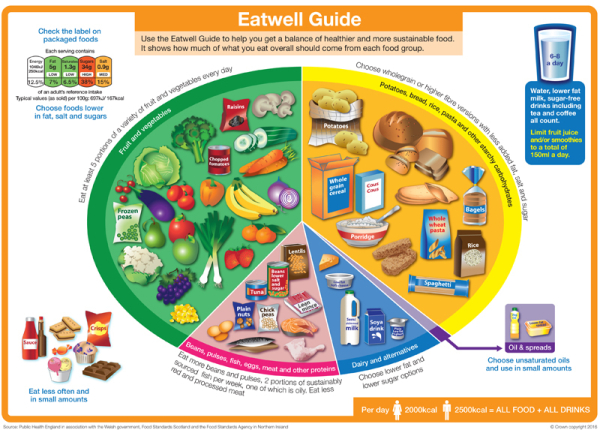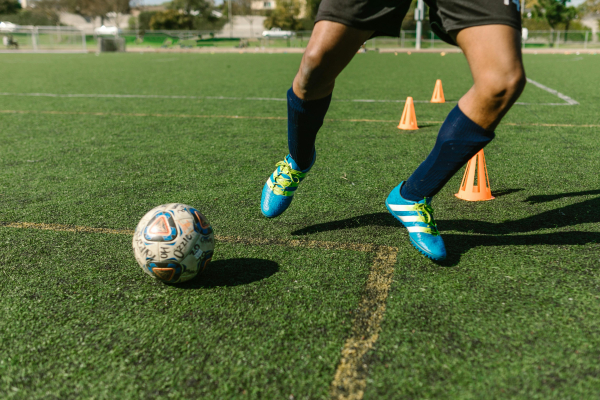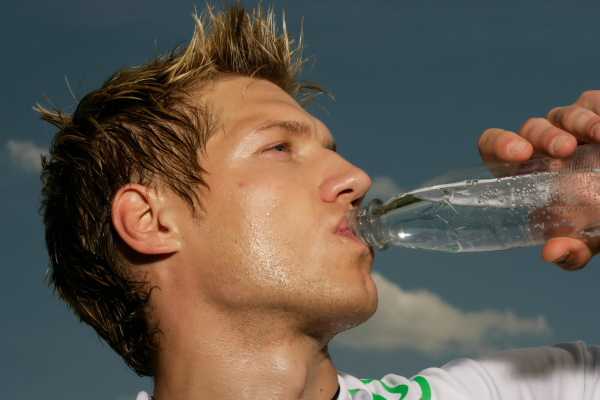
Importance of eating healthy:
Eating a healthy balanced diet is important to help prevent diseases, such as heart attacks, strokes and type 2 diabetes, but it also helps you to feel your best. It’s important to eat a variety of healthy foods to help get all the nutrients and vitamins that your body needs. A healthy diet isn’t about eating less or more, but eating right to support overall health and to maintain a healthy weight and keep both cholesterol and blood pressure at a healthy level.
If you are struggling with food or body image, it is important to reach out for support and help to avoid negatively impacting your physical and mental well-being.
Eating Disorders Association NI
The UK's Eating Disorder Charity - Beat
The Laurence Trust – Supporting men and their families living with eating disorders
What is cholesterol
Cholesterol is a type of fat that is found in the blood and the body makes around 80%, the other 20% comes from the foods we eat. It is needed by the body to function properly, but too much of the wrong type can cause blockages in the blood vessels increasing the risk of a stroke or heart attacks. There are two types of cholesterol:
- HDL (high-density lipoproteins) cholesterol is the good type of cholesterol, their job is to carry excess cholesterol to the liver where it is removed from the body
- LDL (low-density lipoproteins) cholesterol is the bad type of cholesterol that can build up in the arteries
- Triglycerides are a type of fat also found in the blood. When you eat the body converts any unused calories into triglycerides and stores them for later use. If more calories are eaten than burned, triglyceride levels can be raised and increase the risk of strokes, heart disease and type 2 diabetes
Unsat vs sat fats
Unsaturated fats are usually from a plant-based source or liquid at room temperature, for example olive oil, sesame oil, nuts and avocado. The only exception is coconut oil which is a saturated fat. Unsaturated fats help to increased HDL cholesterol.
Saturated fats are usually from an animal source or solid at room temperature, for example red meat, cheese, cream and butter. Saturated fats increase LDL cholesterol.

The Eatwell Guide:
The Eatwell Guide shows you exactly what foods you should be eating, and how much of those foods you should be eating to help maintain a healthy, balanced diet with a wide range of nutrients that your body needs.
-
Aim for at least 5 portions daily – a portion is equal to 80g or 1 handful e.g. 1 apple or 1 handful of strawberries. These portions can be fresh, frozen, canned, dried or juiced. These should make up over 1/3 of the food eaten each day.
These are a good source of vitamins and minerals, as well as a source of dietary fibre which helps with digestion and prevents constipation.
-
Aim to eat 3 to 4 portions each day. These should make up just over 1/3 of the food that you eat every day.
These provide your body with the energy it needs to carry out all essential processes. Wholegrain options contain more fibre than white or refined starchy food as well as more nutrients which is important because your body digests wholegrain food more slowly, helping you to feel fuller for longer and naturally reduces your cholesterol levels keeping your heart healthy.
-
Aim to eat 2 to 3 portions each day of this food group. Also aim to have 2 portions of fish each week – 1 of these being oily fish e.g. salmon or mackerel, as this contains omega 3 fatty acids which helps keep your heart healthy. If you don’t eat fish then you can get your omega 3 fatty acids from a variety of plant foods including: walnuts, flax, chia or hemp seeds.
Beans, pulses, fish, eggs and meat are good sources of protein, vitamins and minerals. Protein is important for muscle growth and development and keeps you fuller for longer preventing snacking between meals. Beans, lentils, chickpeas and other pulses are a good alternative to meat as they contain fibre helping in digestion and keeping you feeling fuller for longer. These are also lower in fat and provide vitamins and minerals to maintain a healthy diet.
In the diet, red meat provides iron, zinc and B vitamins. Red meat includes beef, pork and lamb. Processed meats include salami and sausages. It is recommended to aim for less than 70g of red and processed meat per day. This is due to red meat and processed meats being a source of saturated fat and high in salt – having too much saturated fat can increase the LDL (bad) cholesterol in the blood and a high salt intake is linked to raised blood pressure. Therefore, both are risk factors for heart and circulatory disease – so limit these in the diet to less than 70g per day.
-
Aim to have 2 to 3 portions of these each day. Choose lower fat options if possible. If choosing plant based dairy alternatives choose options lower in sugar and fortified with calcium.
These foods are a good source of protein and vitamins but primarily are an important source of calcium in the diet which is needed for keeping your bones strong and healthy, as well as your teeth!
For vegans who do eat dairy another good source of calcium is green leafy vegetables such as broccoli, cabbage and okra.
-
This is the smallest section on the Eatwell Guide as only a small amount of these are needed in the diet as they are high in fat. Choose unsaturated fats such as olive oil or sunflower oil as these are healthier fats. Also choose lower fat and salt spreads instead of butter to reduce saturated fat and salt intake in the diet.
-
These foods are not found on the Eatwell Guide as they are not needed in the diet, so these should be eaten less often and in smaller amounts. A portion of one of these foods is equal to the size of a yoyo. Examples of HFSS foods include chocolate, butter, sausage rolls, crisps, soft drinks. These foods contain high levels of energy, so having a lot of these in the diet may lead to weight gain.
-
Aim to drink 6 to 8 glasses of fluid every day. Water, milk and sugar free drinks (including tea and coffee) will count towards your fluid intake. Other liquids like fruit juice and smoothies also count however, these are a source of free sugars so limit your consumption of these to no more than a combined total of 150ml per day. If you like soft drinks then you could swap a sugary or full fat version to a diet, sugar free or zero version to reduce your sugar intake.
Food that improve..
-
Vitamin A
- Tomatoes
- Carrots
- Eggs
Vitamin C
- Citrus fruits, oranges
- Peppers
- Broccoli
Vitamin E
- Plant oils, vegetable oil, sunflower, olive oil
- Nuts and seeds, almonds, peanuts, sunflower seeds
Water
-
Vitamin C
- Citrus fruits, such as oranges and grapefruit
- Peppers
- Strawberries
Vitamin D
- Oily fish – salmon, mackerel, sardines
- Egg yolks
- Fortified breakfast cereals
Vitamin A
- Cheese
- Milk and yogurt
- Yellow fruit such as mango and apricots
-
Vitamin B
- Eggs
- Leafy green veg
- Poultry
Vitamin D
- Fatty fish – salmon, mackerel, sardines
- Egg yolks
- Fortified breakfast cereals
Omega 3
- Oily fish – salmon, mackerel, sardines
- Walnuts
- Seeds – pumpkin, sunflower, chia seeds
-
Vitamin A
- Tomatoes
- Carrots
- Eggs
Fibre
- Oats
- Wholegrain – brown rice, brown bread, quinoa
- Bean and lentils
Tryptophan
- Lean meats – chicken, turkey
- Salmon
- Nuts and seeds – almonds, walnuts, pumpkin seeds and sesame seeds
Energy zappers!
- Sugary foods and drinks
- Highly processed foods – crisps, meat pastries like pies and sausage rolls, sweetened drinks, some ready meals
- Foods high in trans fats – fried foods, baked goods like pastries, cakes and biscuits, ready meals, crisps
- Excess caffeine – caffeine gives an initial energy boost but too much can cause dehydration and an energy crash
- Refined carbohydrates – such as white bread and pasta can spike blood sugar levels quickly which is then followed by a dip in energy

Eating for strength:
To maintain strength and muscle mass protein intake is important. Protein is essential when it comes to muscle growth and repair as it provides amino acids which are the building blocks of muscle tissue. Protein rich animal foods include poultry, lean meat, fish and seafood, eggs. Protein rich plant-based foods include lentils, chickpeas, beans, nuts and seeds.
Eating for fuel:
To maintain energy levels carbohydrate intake is important. The function of carbohydrates is to fuel the body with energy to perform all of its processes.
Sugary foods and drinks provide energy quickly as they can be broken down faster. Though this will only provide a short burst of energy which will quickly decline. Starchy carbohydrates are harder to break down which means energy will be released slower. When you exercise you burn a lot of energy, so it is important to fuel your body well before and after exercising.
Choose healthier sources of carbohydrates such as wholegrain pasta, wholegrain bread or rice for a slower release of energy but also higher levels of fibre in the diet which aids digestion and helps you feel fuller for longer.
REDs
Relative Energy Deficiency in sports, also known as REDs, is a condition that happens when an athlete is burning more energy (calories) than what they are consuming to meet training demands. This can have serious implications on cardiovascular health, including a lower heart rate (bradycardia), increased arrhythmias (irregular heartbeat), lower blood pressure and the potential to have long-term effects. The symptoms of REDs include fatigue, frequent injuries, mood changes and for females missed menstrual cycles.
How do I avoid this?
To prevent this, it is important to ensure calorie intake matches energy output, which means fuelling your body with the correct nutrition. So, let’s break it down…
-
Carbohydrates are the bodies main source of energy and therefore are key in sports nutrition. Before training sessions opt for carbohydrates that the body can quickly breakdown, for example bagel and peanut butter, toast and jam, Greek yogurt and granola or fruit juice such as pure orange juice. Depending on training duration, if more than 90 minutes long, carbohydrates may need to be consumed during the session. After exercising it is important to refuel the body with both a source of carbs and protein, for example scrambled eggs and wholemeal toast, crackers and cheese or chocolate milk.
-
Include protein in main meals as well to help with muscle growth, recovery and repair. For some adults they may find using protein supplements useful, however getting protein from food sources should be the focus especially for young athletes. Include a variety of protein foods in the diet such as chicken, turkey, Greek yogurt, cottage cheese, nuts and seeds, chickpeas and lentils in your diet.
-
In sports the body does need some fats in the diet as it can be used as a back-up source of energy especially in endurance sports. Though it is important to choice healthy fat options (unsaturated fats), such as avocados, nuts and seeds, olive oil and oily fish like salmon and mackerel.
It is also important to remember food is fuel so don’t skip meals, make sure to get all three main meals alongside snacks in the day getting your nutrition through foods instead of supplements. Avoid overtraining, include rest and recovery days in the week, stay well hydrated as dehydration can make symptoms worse and be aware of the warning signs of REDs.

Types of protein supplements
Protein supplementation should not replace meals and is not essential to sports nutrition, especially for young athletes, but it is good to understand what variety of options are available for adults.
-
Probably the most popular type as the body is able to absorb it quickly, which can lead to faster recovery, and it contains all nine essential amino acids, the building blocks of protein. Whey protein comes from the cheese-making process, when the liquid part of milk separates from the curds. This means it is not suitable for vegans and for some people may cause digestive issues.
-
Also, a protein from milk, casein is very similar to whey protein except it is digested by the body slower. It can take 6-8 hours to be absorbed by the body, therefore can be taken before bed for overnight muscle recovery.
-
Pea protein is a plant-based protein that comes from yellow split peas, making it a good alternative for vegans and those with dairy allergies. It is absorbed into the body slower and therefore making it more gentle on digestion. Like the animal based proteins, whey and casein, pea protein also contains all nine essential amino acids.
-
One of the most popular plant-based proteins which comes from the soybean. It also contains all nine essential amino acids and is digested slower than whey protein making it more gentle on the stomach.

Hydration in sports
It is recommended to drink 6-8 glasses of water a day, whether training or not. It is essential in sports to be well hydrated in order to replace water lost through sweat. Adequate fluid intake will help to enhance performance and recovery.
Sports drinks can be useful for replacing electrolytes, such as sodium, and providing glucose for energy. However, they are designed for exercise that lasts more than 90 minutes, as like other soft drinks they contain higher levels of sugar meaning they can be high in calories and lead to tooth decay. Instead opt for water, no added sugar diluting juice or milk is a great rehydration option, as it has a high water content but also replaces electrolytes whilst providing carbohydrates and protein for recovery.
